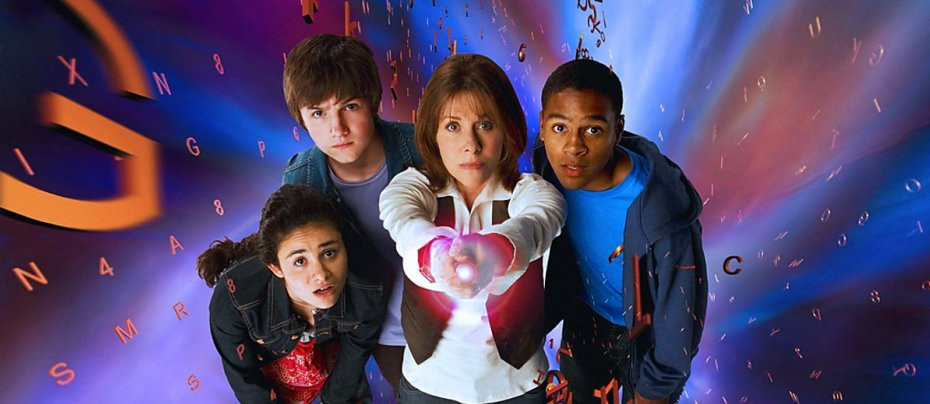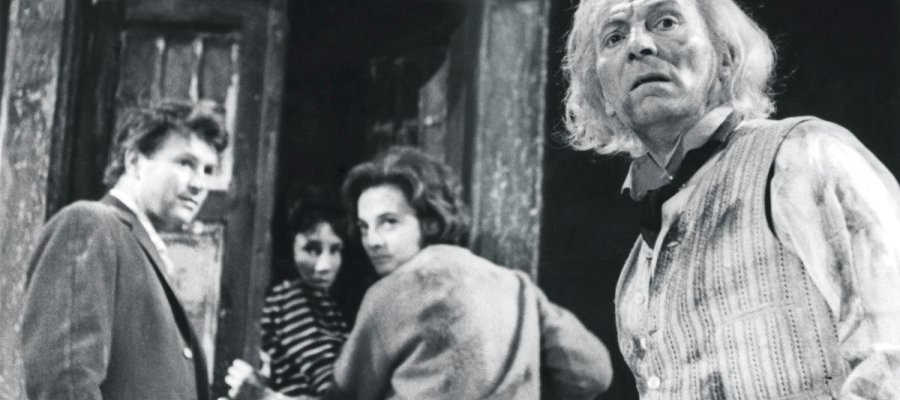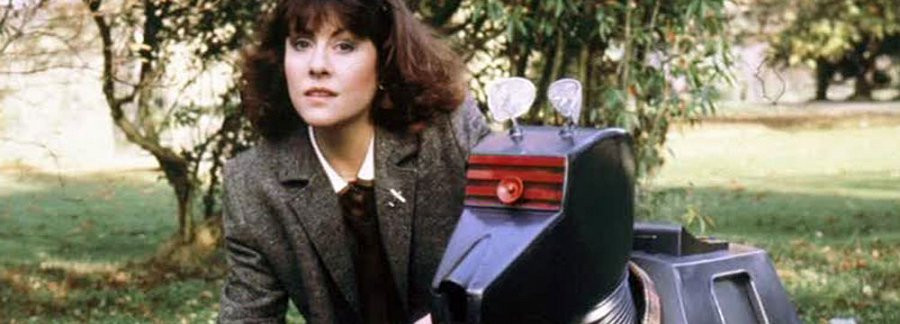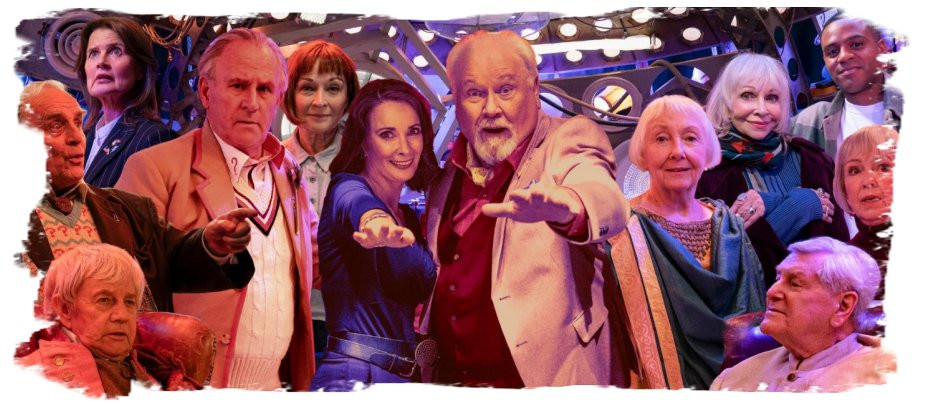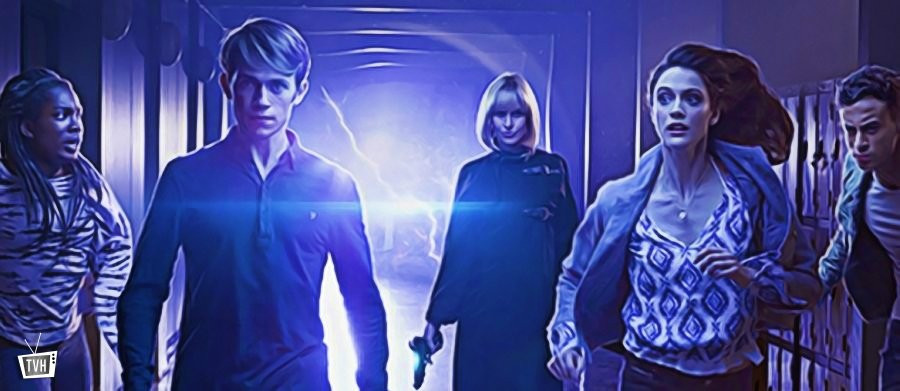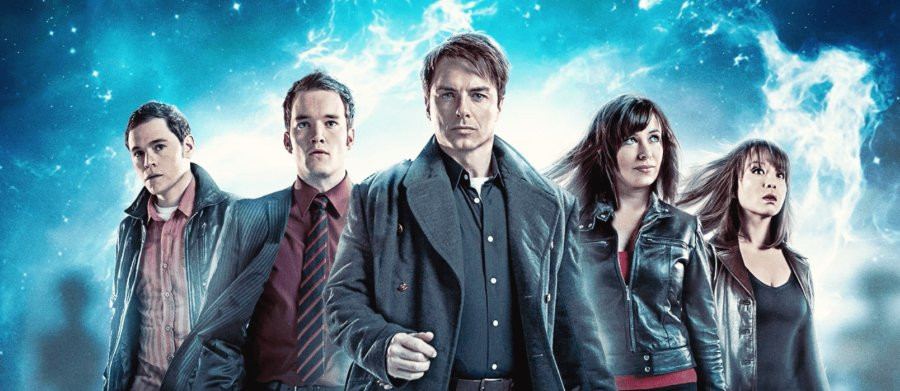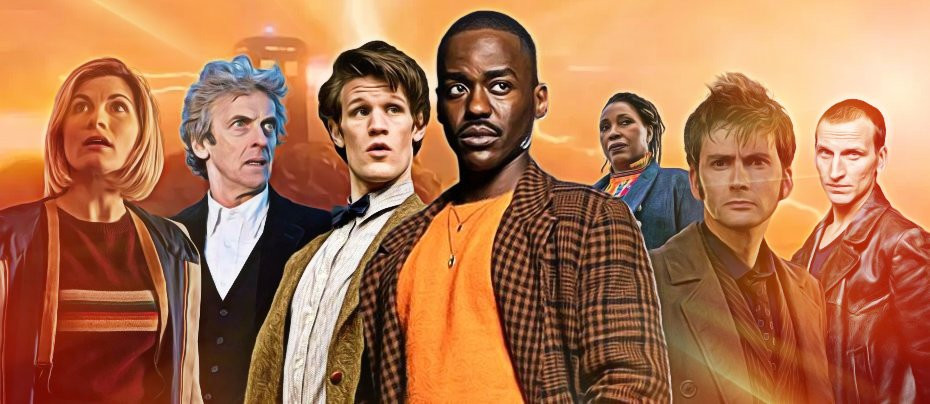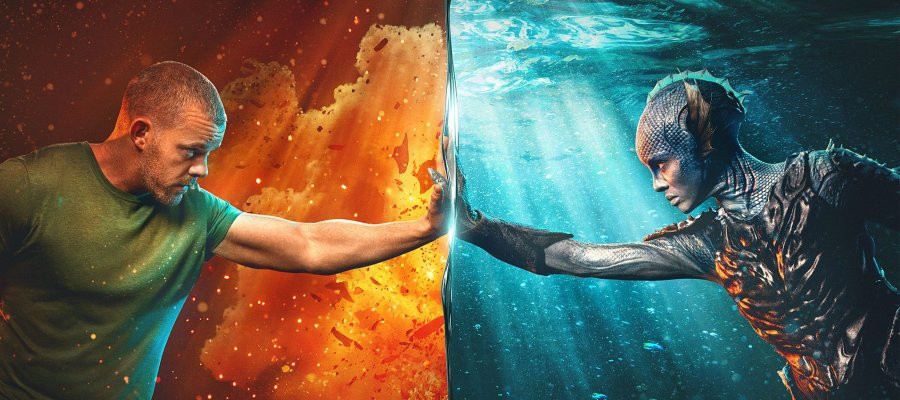Flux
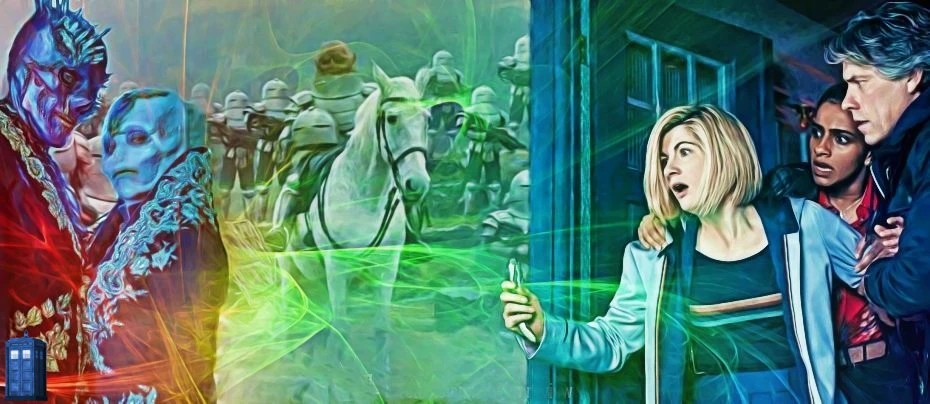
Doctor Who: Flux is the title of the six-part serial that makes up the entirety of Doctor Who's thirteenth series – or its thirty-ninth if we're counting from its very beginnings. The last time Doctor Who did a six-parter was 1979's The Armageddon Factor, unless you count Shada's animated redos, but this is more comparable in length to the 12-part epic The Daleks' Masterplan in 1965-6, or 1986's 14-part The Trial of a Time Lord, which like this made up an entire season.
While there have been arc stories on the programme since it returned in 2005, this is the first time a single storyline has been used for an entire season. That said, there are a lot of different story threads vying for attention across Flux, jostling together and not always quite tying up. The decision to structure series thirteen like this was at least partly one of necessity. The COVID-19 pandemic has impacted the production of hundreds of programmes, with the logistics of filming with the required social distancing and extra health measures meaning that production takes far longer than it would have previously. What would have likely been a ten-episode series had it been business as usual was reduced to an eight-episode run, then further to a series of six, albeit with the confirmation of three further specials in 2023 to round off the Thirteenth Doctor's era.
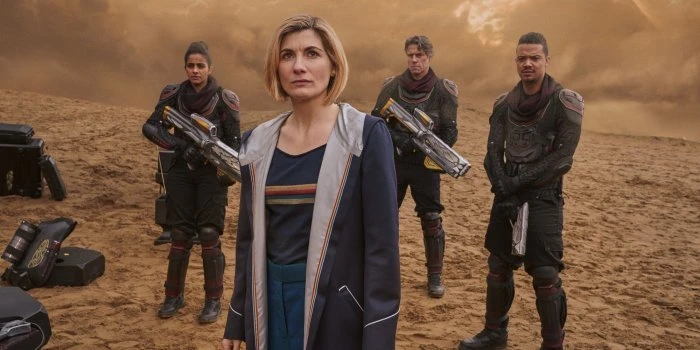
Flux sees the Doctor (Jodie Whittaker) and her faithful companion Yasmin Khan (Mandip Gill) joined by new companion Dan (John Bishop) and space soldier Vinder (Jacob Anderson), as they face the imminent end of the universe itself. Doctor Who has seen the very structure of the universe threatened a few times before, but this series takes the fabric of reality to the very brink, as a mysterious phenomenon known as the Flux sweeps across space, destroying everything in its path. We eventually discover that the Flux is a wave of antimatter (telefantasy fans may note some Deja vu, with this visually and conceptually recalling the multiverse-threatening wave in the CW's Crisis on Infinite Earths massive crossover event). Facing the knock-on effects of history unravelling, a Sontaran war fleet invading the Earth (one of the last planets left standing), Daleks and Cybermen laying claim to the remnants of the galaxy and the machinations of the mysterious Ravagers, the Doctor must search for a reason behind the Flux and see if there's a way to stop it. Meanwhile, the Doctor is searching for the mysteries of her hidden past, a controversial element introduced in series twelve's The Timeless Children.
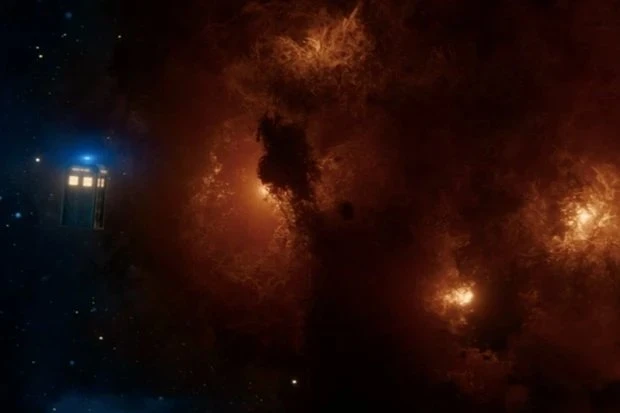
Written by showrunner Chris Chibnall (Broadchurch, Torchwood), with Maxine Alderton (Emmerdale, The Worst Witch) co-writing the fourth episode, Flux is directed by Jamie Magnus Stone and Azhur Saleem, the former returning from Doctor Who's previous season. It is, in all fairness, a bit messy, with new plotlines, characters and concepts thrown in from the beginning to the end, not always with much explanation or resolution. Chapter One, The Halloween Apocalypse, in particular jumped all over the place, setting up elements then dropping them to move onto something else, but that's the job of a first part. No one complained when Game of Thrones visited half a dozen different groups of characters per episode with seemingly nothing to do with each other, then forgot about half of them for weeks at a time. The test is whether it all ties together at the end and finally makes sense, at which it only partially succeeds.
The Halloween Apocalypse was released as a Hallowe'en special, the series' first, although it doesn't feel particularly Hallowe’eny, really. Other than the reliably spooky Weeping Angels, who had a brief appearance, nothing in this episode is especially ghostly or ghoulish, but then again, it's Doctor Who, so we still have plenty of monsters. And so many monsters! Everyone either turns up or is promised to be on their way. Like the Tenth/Thirteenth Doctor team-ups in games and comics, there's a temptation to be cynical here: get some popular monsters from the series' heyday back to win back a few viewers. But wasn't it ever thus? Did anyone moan when Russell T. Davies revamped the Daleks, the Cybermen and the Master for his new vision of the series? In Rose, he practically recreated elements of Spearhead from Space shot-for-shot. Steven Moffat brought in huge alliances of monsters in his season finales and specials.
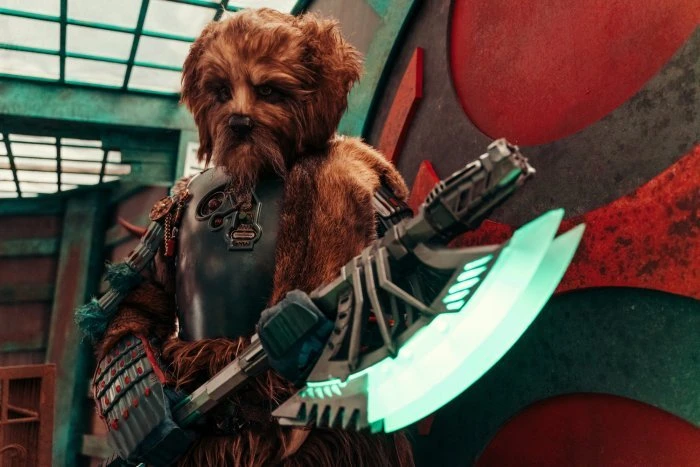
Just the same, the tacked-on Hallowe'en element isn't really any different to the arbitrary Christmassy setting of The Husbands of River Song or the entirely pointless Easter egg scene in Planet of the Dead. It's a hook, nothing more. It's, frankly, a poorer hook than "the universe is ending.” With that in mind, it seems justified that every monster is turning up. We also have various new aliens. Karnavista, an alien of the Lupari race, is a lot of fun: a six-foot humanoid dog tasked, like all his people, with protecting one specific human (one of the plot points that is never satisfactorily explained) played by Craig Els (Ripper Street, Coronation Street) in an all-enveloping fur suit, he's just an ordinary bloke doing a job he's not keen on but he's going to get it done, and the Doctor just keeps hassling him. The serious daffiness of an alien dog for every human dovetails into the reveal of the Flux, the infinity wave coming for the Earth. It's intriguing that Karnavista is, or was, part of the Division, which we'd assumed to be a purely Time Lord organisation.
As for our big bad.: Swarm is a gnarly skull-faced crystalline guy, apparently imprisoned by the Division donkeys ago, with help from the Doctor. Played by Sam Spruell (Jack “The Hat” McVitie in Legend among much more) for the bulk of the serial, and Matthew Needham (Sanditon, The Ritual) pre-regeneration, Swarm's background and motives remain pretty opaque throughout. Spruell eats up the scenery, which suits a flamboyant villain like Swarm, but while his enmity with the Doctor (for an act she doesn't even remember) is intriguing, his mission to wage war against space is nonsensical. The idea of a war between Time and Space sounds evocative, but ultimately, it means very little.
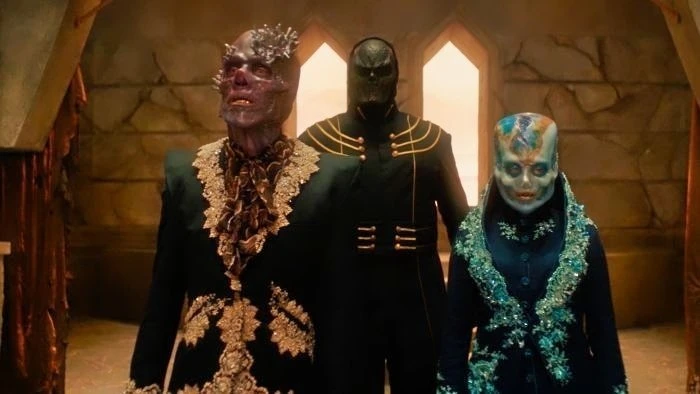
After he escapes his prison, Swarm gets out and goes on a little drive to Scandinavia, where he kills some guy who likes chillies and reverses the disguise of a human into his sister/partner-in-crime, Azure. Swarm's intimidating enough, but the big reveal that the nice lady is actually another crystalline skeleton is a bit of a pointless twist. We don't care enough about her or her husband for it to mean anything, and we don't know enough about Swarm and Azure for the reveal to make an impact. When Ruth turned into the Doctor or O. was revealed as the Master, it was a shock, because the characters had been built up enough and the reveal meant something. This is just... stuff happening. Rochenda Sandall (Line of Duty, Small Axe) makes little impression as either Azure or her human disguise throughout the serial.
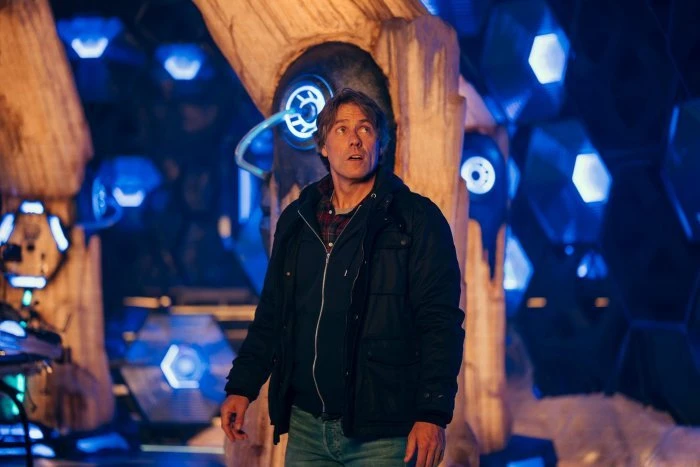
Stand-up comedian John Bishop is a nice addition to the regular cast, and while he's hardly the greatest actor the show's ever hired, he's hardly the worst, and he does what he needs to: play the most Liverpudlian bloke in history and be jolly nice. It's interesting we've got a genuinely poor person in the TARDIS, not another essentially middle-class companion. Dan (a fine name) is a decent sort in a bad situation doing his best to help out and keep his chin up. His cautious romance with Diane (Nadia Albina – Innocent, The One) is rather sweet, cut short as it is by their separate abductions by aliens. Albina gives a strong performance throughout, and it's commendable that her disability is neither here nor there to the story.
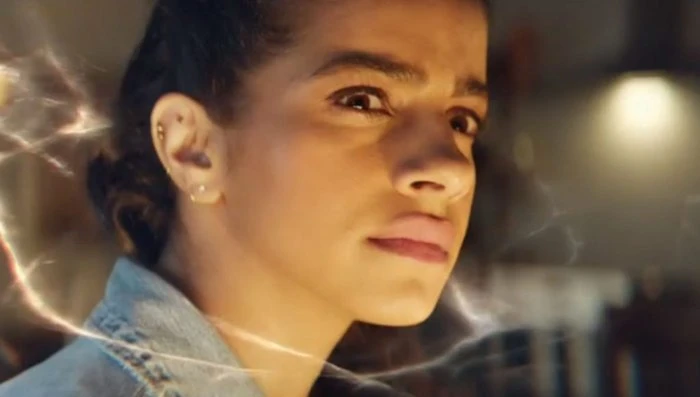
I'm disappointed that we don't get more time with Jodie and Mandip running the show, though. An all-woman team in the TARDIS has never happened, so a Thirteen-Yaz team-up would be interesting to watch. The glimpse we get though, in the unapologetically silly opening, suggests they've been doing this for a while (there's the space for Big Finish's inevitable run of twelve boxed sets) between seasons. At last, Mandip gets to do something with her character, being proactive and impressive instead of just reacting and asking questions. Jodie seems more dynamic too, and I really feel we're missing out on not keeping the smaller TARDIS team for longer. Still, it's fun that Dan is the damsel in distress and that the two women have to come in and rescue him.
The Halloween Apocalypse is, essentially, a string of set pieces introducing various characters and settings. Vinder, Claire and Joseph Williamson are introduced, along with the real-life mystery of the tunnels under Liverpool's Edge Hill are all briefly introduced, ready for more exploration later on. It's largely style without substance, but that's OK for an opening episode. It's all flavour. After the frenetic first episode, Flux settles down into something a little more focused. In Chapter Two, War of the Sontarans, we're still very much in the "chuck stuff at the screen and see what sticks" stage of the proceedings, but there's more time spent on the individual settings, so it actually feels like we have some story here rather than mere set-up. War of the Sontarans sees the Doctor, Yaz and Dan survive the Flux but crash back to Earth in Sevastopol during the Crimean War, where the Sontarans have perverted history, taking the place of the Russian army.
Having lost Bob Baker – co-creator of K-9 and Gromit, my two favourite fictional dogs - and enjoyed some online looks back at his Who career, it occurs to me that Chibnall is very like Bob Baker and Dave Martin (writers of classic serials such as The Claws of Axos and The Invisible Enemy) in his approach. He has excellent ideas and an eye for an arresting visual, but not always a solid idea of how to make a story work around these concepts. Chibnall's weaknesses are largely in dialogue, particularly exposition and plot logic. Doctor Who has never been particularly big on plot logic, but the better stories have been the ones that can distract you from the lapses with wit and panache. Chibnall... doesn't always display those qualities.
I'm trying to get the negatives out of the way before focusing on the good side of this episode. It's one of the Thirteenth Doctor's best and some critics really rated it, but when it's good like this the weaknesses just jar more. There's some shocking dialogue here, most notably the crashing exposition bombs from Dan and his parents. Dan actually comes out with a line like, "So she's a real historical character, but these Sontarans aren't?" Nobody speaks like that unless they're watching something like Doctor Who. Unless Dan is going to be revealed as some kind of metafictional viewer stand-in, and if he manages to pull that off then hats off to him, then this is just bad.
Equally there are some huge lapses in plot. The Flux, which apparently destroys everything, dumps the damaged TARDIS in the Crimea in the 19th century and plops her passengers down with it. Fine, no problem, it's not like everyone was going to die anyway and the Flux is still a mysterious and unexplained phenomenon. But then some other wibbly effect shifts Dan back home and Yaz seemingly randomly to the temple where Vinder has also appeared, and the Ravagers are infiltrating. Why send them all to the Crimea in the first place if you're immediately going to scatter them again? And why not at least try to throw in some technobabble and a reason for the coincidences into the script, just to pretend you care about plotting.
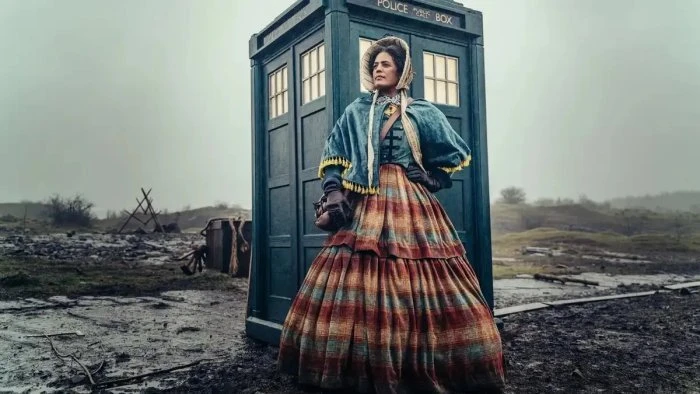
Jacob Anderson (Game of Thrones, 4-3-2-1) is a fine actor but his character doesn't really make a mark in his first two episodes. Was Vinder always in the mix here or did he replace someone else? At least Yaz still benefits from being the lead hero in her sequence. The temple sequences on the Planet Time are pretty fascinating and look incredible. However, the big triumph of this episode is the Sontaran intervention in the Crimean War. The visual of the Sontaran army battling the British in Sevastopol is wonderful, just the thing Doctor Who is made for. Sara Powell (Silent Witness, Damned, Holby Blue) is rather perfect as frontline nurse Mary Seacole, another in this era's commendable line of female figures from history recreated by a talented actress. As with Nora Khan and Ada Lovelace before her, Seacole doesn't get enough time or exploration to really show why she was such a remarkable individual, but she works well as the latest one-off pseudo-companion.
Wonderfully, the Sontarans look like they did back in 1973. A direct update that remakes the classic look with modern methods and realism. More importantly, they're still funny, which is an important a part of what makes the Sontarans work as the clone armies with probic vents. The newly-old Sontarans are spot-on. Dan Starkey (best known as Strax in Matt Smith/Peter Capaldi-era Who) still gets to play various clones, but it's Jonathan Watson (Two Doors Down, Rab C. Nesbitt, Only an Excuse?) as commanders Skaak and Riskaw who really steals it. A gruff Scotsman is somehow just right for a Sontaran warlord. It's gratifying that, while he's made the Sontarans into a major threat again, Chibnall hasn't forgotten that they're also funny. (The horse line is priceless.)
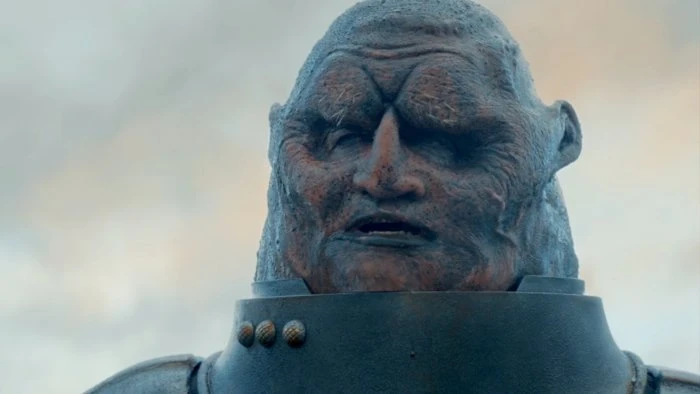
On the other side, though, the stuff in contemporary Liverpool is pretty dire. Bishop remains thoroughly watchable in spite of being lumbered with puns that made even me wince, but the plotting around it is totally sloppy. Sontarans mowing down British soldiers before being destroyed in a desperate act of vengeance? That's one thing. One Scouser taking out an invasion fleet with a wok? Taking things a bit far. There's also some massive logistical problems with the Sontarans invasion of time. Having them replace Russia and China in history raises huge questions but works, but when we drop into modern Britain the implication is that they've been ensconced as the rulers of Earth ever since. Yet we then learn they've only been there two days. In which time they've set up a national curfew and already generated a resistance movement.
There's plenty that doesn't add up yet, and that's a pity, because this is solidly entertaining, with Whittaker at her most Doctorish and some great moments. Yaz looking at her wrist and silently taking in her WWTDD note is perfect. She doesn't need to read it out and translate it; it's only later that Swarm spells out "What Would the Doctor Do?" for the five people in the audience who didn't get it, and this serves to reinforce how he is familiar with the Doctor and their effect on their companions. Chibnall can do it, so it's doubly frustrating when so much clunky material makes it through.
A somewhat divisive episode, Chapter Three, Once, Upon Time is, for my money, one of the best episodes of Doctor Who in a long while. It feels like a genuinely new and interesting approach to Doctor Who, a dreamlike wander through the main characters' lives that raises as many questions as it answers. After two episodes of seemingly disconnected set-up, it feels like we're finally getting somewhere, and there's a resolution coming, even as new elements are still being placed on the board.
While Chibnall's dialogue still includes some clunky exposition, particularly from the Doctor, on the whole the script is more polished, and both stranger and easier to follow than previous instalments. Throwing the Doctor and her friends into their timestreams is a clever way to explore them and the ongoing plot, while setting up little hints of the upcoming story. Given the chance to play different roles as they step into other points in each other's lives, the actors are given a chance to really show what they can do. Whittaker and Gill are especially good in this respect, with Whittaker in particular showing just how naturalistic and charismatic she can be when given the right material.
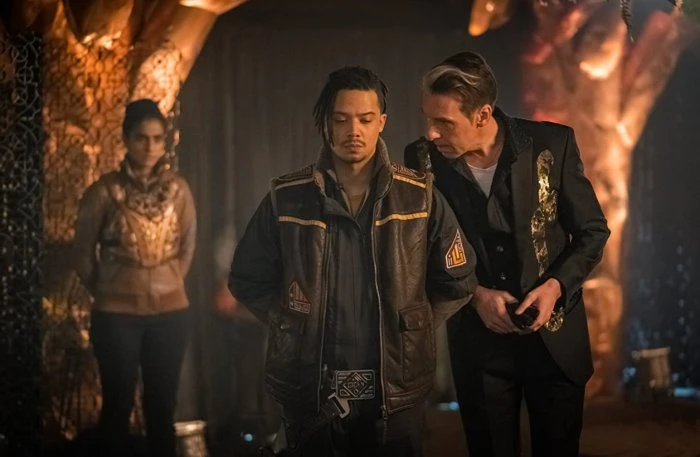
Jacob Anderson stands out in a different way. We don't really know Vinder yet, so having him appear as other characters doesn't have the same impact, especially considering he just poses as other soldiers. However, we finally get some exploration of who Vinder is, what his background is and what drives him. A noble soldier punished for doing the right thing, Vinder is a genuinely strong character, and while it's arguably too late in the day to give him focus like this, at least it's finally happened. Anderson is great given a chance to do more than simply react to things, giving a strong and subtle performance as the morally torn young man. In his flashback we also have some nicely sketched-in worldbuilding, as the Grand Serpent (a wonderfully selfish and grandiloquent Craig Parkinson – Line of Duty, Misfits, Intergalactic) manipulates the politics of a distant part of the galaxy. He's a strong villain, and while the eventual continuation of his story doesn't do him justice, he stands out here.
John Bishop isn't as good in his various roles, but he brings enough charm to the proceedings to make up for it and he gets more material to make Dan three-dimensional, after the fluff of episode two. Again, he has strong chemistry with Nadia Albina's Diane. There's a suggestion throughout the serial that there's something more to either Dan or Diane, but while this doesn't go anywhere, it's hard not to see the suggestion here. Why else would the Ravagers abduct Diane to pressure Dan, and why is Joseph Williamson's plans on Dan's virtual doorstep so important? Dan seems far too proactive and ready a time traveller to just be some ordinary bloke, and Diane is later astonishingly capable. Either this is one of the many threads that remains dangling, waiting to be picked up after Flux, or else it's more tatty writing.
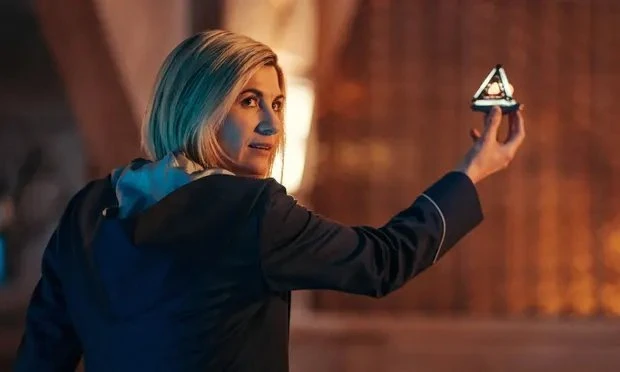
The mystery of the Doctor's timestream is more interesting though. It's clever switching the Doctor in for a different version of her own character, with a surprise appearance by Jo Martin as the mysterious Fugitive Doctor, at a point presumably prior to the events of 2020's "Fugitive of the Judoon." We finally get a look at this Doctor working for the Division and being as ruthless as we've been told she is. The planet Time, under siege by the Ravagers, seems too visually similar to Gallifrey for it to be coincidence, and the Mouri too like the old image of the Time Lords as godlike beings ruling over time for it to be unintended. More mysterious still is the character played by Barbara Flynn (Cracker, Open All Hours, Wives and Daughters, Kate & Koji), seemingly a powerful but uncaring being who is bothered more by the Doctor's conduct than the end of the universe (or rather, "this universe”). The eventual reveal isn't as exciting as it might have been, but for this episode at least, the mystery is enticing.
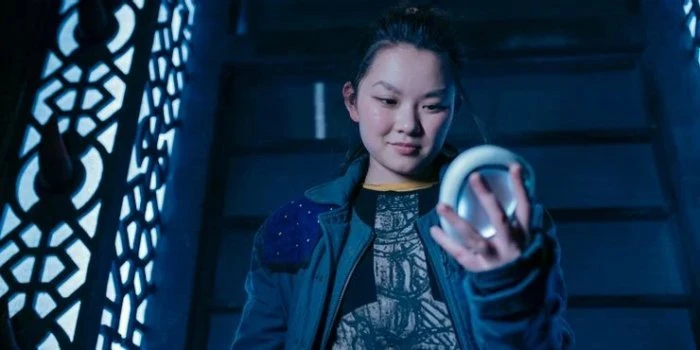
Among the best things in the episode is the lovely Thaddea Graham from the sadly cancelled The Irregulars. She's likeable and impressive as the swift, smart and assured Bel, a survivor in the post-Flux universe linked, perhaps a little predictably, to Vinder. Facing down a platoon of Cybermen and sneaking past a phalanx of Daleks, she could give the Doctor a run for her money. On the subject of familiar monsters, I liked the use of Daleks and Cybermen as an aside, showing just how dire the situation has become with the universe on the brink and its most ambitious powers fighting over the rubble. They remain a minor part of the serial throughout, but it would be unlikely they weren't involved somewhere if the universe were under threat. Equally, there's some good use of the Weeping Angels, livening up Yaz's otherwise not-terribly-exciting scenes and reminding us of the mystery of Claire and her link to the Doctor, nicely setting up Chapter Four.
Once, Upon Time balances the usual Doctor Who timey-wimey nonsense and silliness with an arresting mystery and some gripping scenes. It's a shot in the arm for the series, giving the serial some needed mystery and momentum. While it's understandably not to everyone's taste, it's at least something different than the usual run-around, even if there is still too much time spent with the Doctor breathlessly catching herself - and us - up on the plot.
Chapter Four, Village of the Angels is a gripping episode that combines the best of time-hopping weirdness with good, old-fashioned spookiness. The Weeping Angels are, of course, one of the most popular and inventive monsters ever featured in Doctor Who, and there's still little enough of them that their inclusion here is exciting in the way that the return of the Daleks and Cybermen aren't. Even the Sontarans, while it was a treat to have them feature properly for the first time in ages, aren't as clever or unique a concept as the Angels. Interviews with the cast suggest a palpable excitement in having them appear. Village of the Angels feels special, not only because the Weeping Angels are such a brilliant monster but also because the episode is straightforwardly high quality in a way we haven't really seen lately.
Given that the Angels are the quintessential Moffat era monster, it's unsurprising that the episode has a very Moffat-y feel, more so even than Chapter Three's, with an almost storybook vibe to the creepy village with its old-fashioned inhabitants. After 2007's exemplary episode “Blink,” though, the Angels never quite worked as well even with Moffat writing, their simple but ingenious central concept being added to until it became diluted and overcomplicated. Here, though, everything builds more naturally. It's assumed that, if you're watching this, you've probably at least seen Blink on iPlayer and probably know the basics from the previous years, with a few reminders that you mustn't blink and that “the image of an Angel becomes an Angel” dropped in for good measure. Now that the excessive abilities introduced in The Time of Angels are fully established it's easier to just get on with it and have them come for the Doctor as a truly relentless threat.
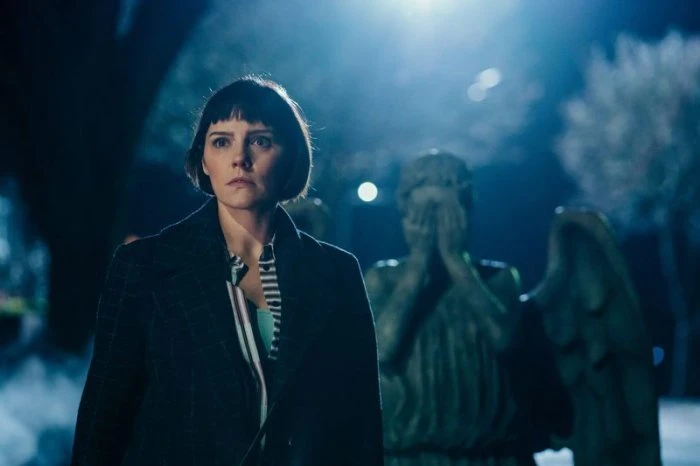
This episode feels less like a first draft than a lot of this era's stories. Maxine Alderton's clearly a real talent and while we don't know how much of this is hers and how much is Chibnall's, they clearly make for a good team. Persistent issues such as the clumsy exposition and the sometimes-weak characterisation of the Doctor are cleaned up here, with Dan's role as exposition engine lampshaded and the Doctor being a proactive force while also allowing her to be terrified and wrong-footed by the Angel's attack. In the previous week's episode, I felt that Whittaker was better when playing the Fugitive Doctor than her normal incarnation, as it was simply stronger material, but here she gets to be a version of her Doctor that really works.
Yaz gets to actually be a police officer, bringing skills and an approach that other characters simply wouldn't try, in her attempt to track down the missing girl Peggy. It's a bit obvious that, when a mysterious old lady starts wandering around muttering about these things happening again, they're going to be revealed as the same person after a time jump, but it's still effectively told and played. The guest cast are uniformly good, but plaudits especially to Annabel Scholey (The Split, Britannia, Walking on Air) as Claire. After her brief but tantalising introduction in Chapter One, she's built into a fascinating character, a forthright and capable woman who happens to be a powerful psychic and is stuck living more than fifty years in her own past. There's enough promise in that for a whole series in itself. Kevin McNally is almost as good as Professor Jericho, a delightfully old-fashioned sort of character who absolutely fits with the haunted village vibe. The actor, known for the Pirates of the Caribbean film series and TV credits such as TURN: Washington's Spies and Designated Survivor, provides a bit of a Quatermass-vibe to the proceedings.
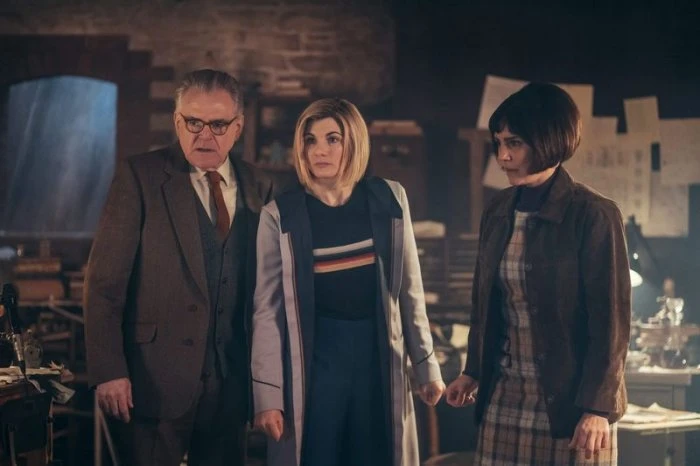
There are still logical flaws in the Angels concept, such as no one taking the obvious route of at least trying to take turns blinking. The visual of people being crumbled to dust if they contact an Angel a second time is chilling. I love the concept of a premonition of an Angel constituting an image, thereby rooting itself in Claire's mind, although by this logic anyone who's ever seen an Angel would have one living in their head as a memory. It's easy enough to overlook this though when there are so many striking concepts so well put across, including the uplifted village plucked out of space and the idea of a rogue Angel. The Doctor actually comes off rather badly, refusing to listen to such “a creature,” but the Doctor's more interesting when they're morally dubious. The Division is becoming a far more interesting idea than it first appeared, where it was basically the Time Lords' CIA under a different name. Now it seems to be a much bigger, multi-species concern that employs a whole phalanx of Weeping Angels to maintain time. We end with one of the best cliff-hangers in recent memory.
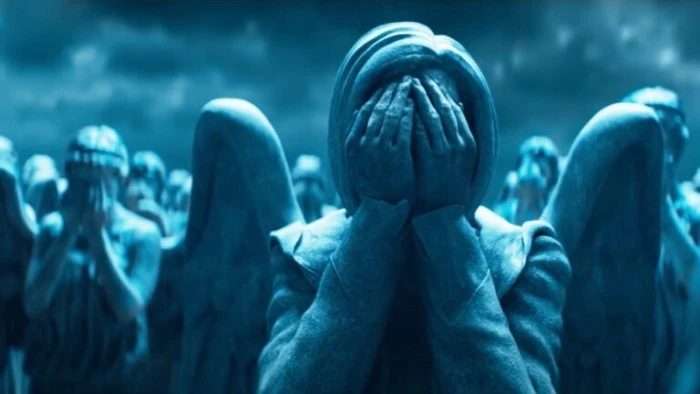
The penultimate part of a six-parter is traditionally the time when all the questions get answered and we settle down for an action-packed finale. This isn't the classic series though, and Flux is very unlike a traditional Doctor Who six-parter. Each episode has had a distinct feel and new content, keeping things as fresh as in any of the always varied modern series while still building towards a single narrative finale.
Yet Survivors of the Flux continued to drop new revelations on us even as it was answering earlier questions. Chapter Five doesn't hang together as well as the previous couple of episodes and has a distinct feeling of being a bit rushed. The impression is that this was originally several episodes, but the continued shortening of the season due to COVID restrictions and changing plans at the BBC meant that a lot of storylines got squashed together here. However, Chibnall pulls it off, giving us a rather baffling but highly enjoyable episode. This instalment gets away with it, keeping everything moving and ratcheting up the intrigue and excitement so that there's no time to go “hang on...” until you've settled down to beddy-byes later that evening.
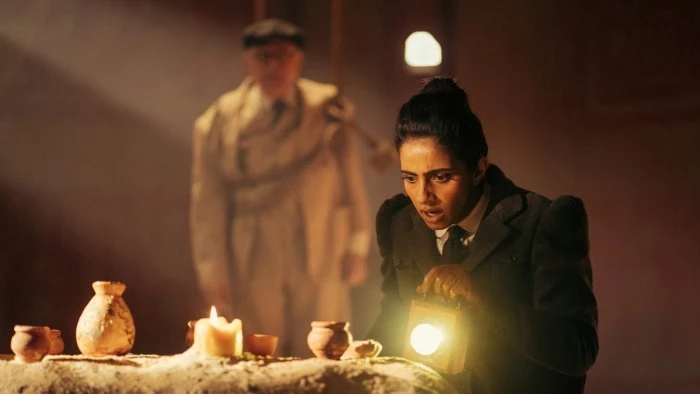
The adventures of Yaz, Dan and Jericho trapped in the early twentieth century could happily have stretched to a six-part serial in themselves. Yaz has now settled down to her status of leader of the team, a substitute Doctor leading two middle-aged white blokes around and generally being rather awesome. Having her pick up her spirits and resolve by replaying the Doctor's message in times of stress is a nice touch. In the end, though, their mission, to discover the vital information of the Earth's impending doom, seems to be forgotten halfway through. Instead, they switch to trying to let Karvanista – still 117 years in the future for them – find their location. Why they've suddenly become determined to get off the Earth by any means necessary isn't clear, nor how they expect to go about it, as even the dog-faced space pilot readily notes that he doesn't have a time machine so can't pick them up. You also have to wonder just how the trio financed their way around the world on their myriad adventures, given that none of them had any resources to call on in the 1900s.
Bel and Vinder's story continues on in the background, reconnecting with the grand narrative towards the episode's conclusion. Rumours remain as to the identity of their baby, but as it is, the characters remain somewhat outsiders to the storyline here, and don't stick around after the serial concludes. An unexpected turn of events comes as the Grand Serpent returns – itself not a surprise, but the manner is a sudden twist. Seemingly a contemporary, albeit alien character in 2021, he appears in the 1950s at what is revealed to be the early days of UNIT, allying himself with Robert Bathurst (Cold Feet, Red Dwarf) as a posh officer and then murdering him rather unpleasantly.
The history of UNIT seen here doesn't quite fit in with what we've seen on screen over the years, and the valiant attempt to tie in the events of 1966's The War Machines only complicates matters further. All these little asides, and a vocal cameo by the late Nick Courtney as the Brigadier himself, are lovely, but don't actually add up to anything coherent, but then, UNIT dating has always been a notorious mess. If anything, making it worse seems rather in keeping. It's nice to see Jemma Redgrave (Grantchester, Cold Blood) back as Kate Stewart, as well, after an absence of six years. It helps tie everything together into one big, long adventure. As fun as it is to see Kate hoarsely taking down Prentis, aka Mr G. Serpent, you wonder why a military officer in charge of an alien-fighting group doesn't have, I don't know, some kind of gun that might be useful against him? When they dissect the body afterwards and find it made out of snakes, she's sure to be backed up.
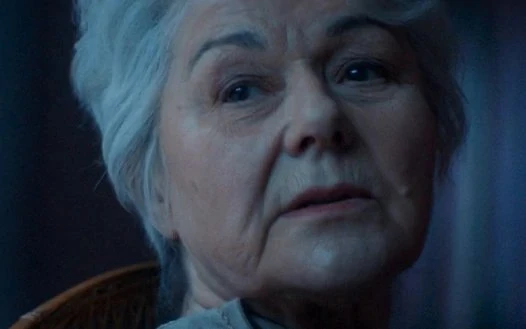
Meanwhile, outside the universe, the Doctor hatches from her stone prison and faces down Barbara Flynn's character, who turns out to be Tecteun, the universe's nastiest foster mother. Having the mysterious mastermind turn out to be, essentially, the Doctor's mum is a bit of a let-down but quite an obvious move, and there was bound to be a confrontation with her eventually. While Whittaker is impressive in these scenes, they fell a little flat to me. Tecteun's motivation was all over the place. To begin with, we learn the Division are destroying the entire universe because the Doctor has interfered with it too much and it's the only way to be rid of her and start from scratch. This seems, even given the Doctor's inflated status over the years, to be insanely over-the-top. Then Tecteun tries to bribe the Doctor into joining forces with her in the next universe by promising to give her her memories back, which goes against the Division's entire stated motive.
This is all fairly baffling, and unfortunately shows up how difficult it is to accept the Division as the all-powerful force they're made out to be. Retconning in something like this is always going to show up some logistical flaws, but by making the Division the secret power behind pretty much everything, it's hard to accept they're really what they say they are. We can accept that they had operatives all over the Time War, for instance, or that the CIA (Celestial Intervention Agency) were really a front for them, but you have to ask where they were when Rassilon, Davros or sundry others were trying to destroy the entire multiverse. Events which were only stopped by the hated Doctor, of course. Still, on its own terms, the Division is an intriguing and powerful threat, albeit one that has seemingly sown its own destruction in the form of Swarm and Azure.
Chapter Six, The Vanquishers, is a mixed bag. Let's begin with the positives, though. This is a belter of an episode for the Sontarans, more so even than part two, giving the ludicrous space goblins a chance to really stand up to the big-league monsters. They're still the butt of jokes - Dan Starkey's chocoholic soldier being a very silly diversion - but they work as a serious threat. For once they're the terrifying military force they're always claiming to be. Murdering entire peoples, barring Karvanista, hunting them down on their own ships and killing them one-by-one, winning through sheer force of numbers - that's the Sontaran threat we've heard of all these years.
The Doctor's peculiar journey throughout, wrestling with the promise of her lost memories, while she is split into three facets who work together and apart to save the universe - excellent stuff. Yes, it's highly derivative of 2008's "Journey's End," which had the Doctor and his duplicate save the multiverse together, but it's not a take-for-take rip-off and that was twelve years ago now. In fact, at times it looks like it's riffing on The Three Doctors, and that was in 1972. Whittaker is on fire snapping and flirting with herself - she's had to spend far too much of her time as The Doctor talking to herself, but this makes it into a game. That's not to say she doesn't have serious moments as well, and her eventual reunion and confrontation with Yaz is well worth waiting for.
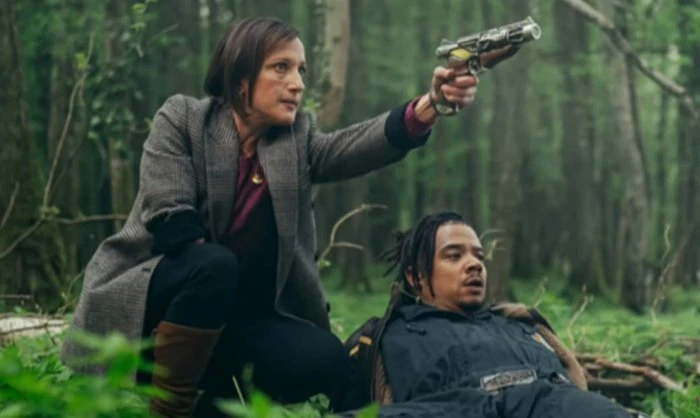
On the subject of reunions, Bel and Vinder's discovery of each other is a lovely moment. Jacob Anderson is great when he gets solid material, and Thaddea Graham is magnetically watchable in all her scenes. Equally impressive is Nadia Albina as Diane, who finally gets to make a contribution to the plot, even if it's not entirely clear why her character is given such unique treatment by the Ravagers. Still, she's a badass, and we could do worse than having her on side the next time aliens come invading. It's a shame we're unlikely to see Kevin McNally back as Professor Jericho, who would have made a fun recurring character in 20th century settings had he survive, but at least Claire gets a resolution of sorts to her story. We still don't get a full rounding off of the Angels storyline, but not everything has to be crossed off.
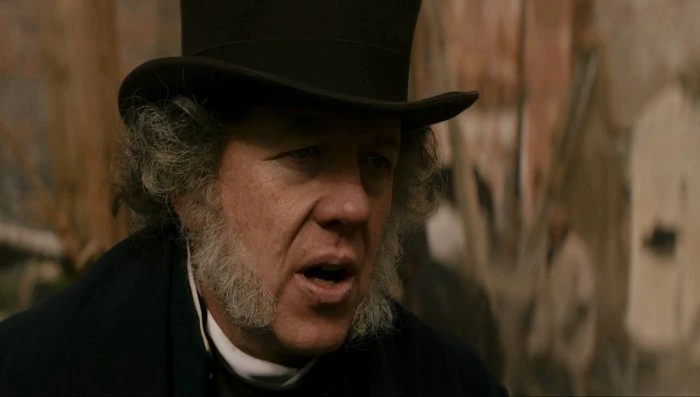
It's about time we brought attention to Steve Oram (Code 404, People Like Us, Glue), and his outlandish and bizarre performance as the eccentric Joseph Williamson, with Team Yaz finally catching up with him and his network of tunnels that lead to doorways through space and time. A genuine historical mystery, the network of tunnels he had excavated under Liverpool for uncertain purposes are a fascinating running thread to this serial. There's no explanation given for the doorways through space/time, and whether this ever gets picked up again or will be forgotten with this story's end is unclear. Either way, while being known forever as the "Mad Mole of Edge Hill" is pretty cool, Williams is hardly "too important to history" to risk, although if he was killed before he'd finished the tunnels they were all standing in, what a tricky paradox to deal with along with everything else.
Other characters fare less well. Kate Sewart is entirely unnecessary, doing nothing much to contribute to the plot. She's just sort of there, seemingly only to give her an opportunity to meet the current Doctor. Craig Parkinson remains icily cool as the Grand Serpent, but there isn't any clear reason for him to be allied with the Sontarans and he seems superfluous. Still, he gets some excellent moments, particularly his complete dismissal of Vinder whom he doesn't even seem to remember - a mere footnote in his life of power-grabbing and murder. His comeuppance is fairly satisfying, but he's likely being kept alive for a return appearance, which should make his story mean more. Assuming he's not another iteration of the Master, that is. He did turn into a body-snatching snake once, after all.
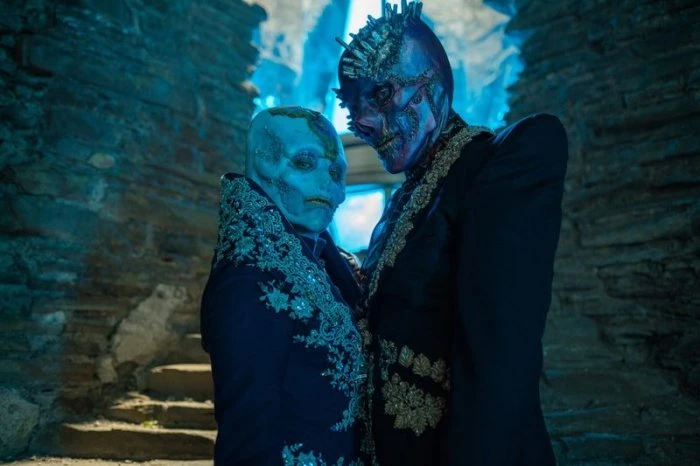
It's in the overarching plot with Swarm and Azure that things really fall flat. While they look pretty striking, there's not been much to the Ravagers throughout, and their plotline just doesn't hang together. None of it really seems to mean anything. Having the Doctor face a vengeful enemy from a time in her life she doesn't remember is a solid idea, but it needs proper attention, and it's lost in all the other goings on. When we finally discover that Time is some kind of living entity, we're left with even more questions and no sign of any answers.
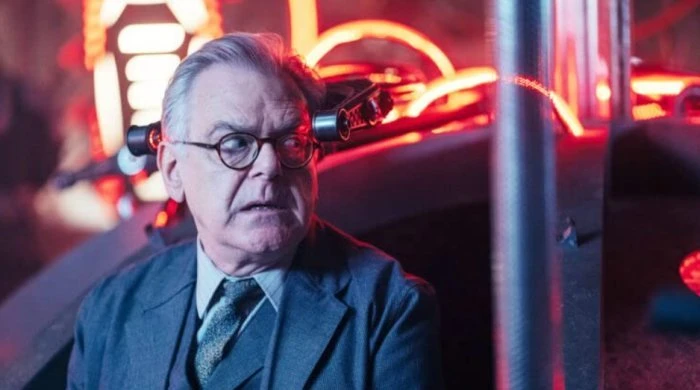
Finally, we have to address the Doctor's actions in this episode. The Sontarans, in their ruthlessness, plan to use the Daleks and Cybermen to absorb the Flux, wiping them out in the process. Aside from a complete misunderstanding of how antimatter works - something of a Doctor Who tradition - it's a brilliant play on the ruthless warriors' part. The Daleks and Cybermen seem a little gullible to fall for it, but doubtless they were planning on betraying the Sontarans themselves. It's evidence of how monstrous the Sontarans are - and yet the Doctor, instead of trying to save the Daleks and Cybermen, uses the Flux to wipe out both race and the Sontarans as well. It's premeditatedly ruthless by even the Doctor's standards. I'm all for the Doctor being a terrifying force, but it sits poorly with the idea that her Fugitive incarnation represents a darker side to her. Why, because she works for a dodgy organisation and carries a gun? Did she just wipe out three whole species?
It leaves the Whoniverse in an unclear and precarious state. I hardly think the Daleks, Cybermen or Sontarans are actually extinct; the Daleks, after all, return a month later for the New Year's special Eve of the Daleks. However, the universe is still apparently sitting at 90% wiped out, with nothing but Earth and a handful of devastated worlds left. No mention is made of this at all, and the Doctor and co. leave for adventures without considering there's nowhere left to explore. Surely they've got to follow some of this up?
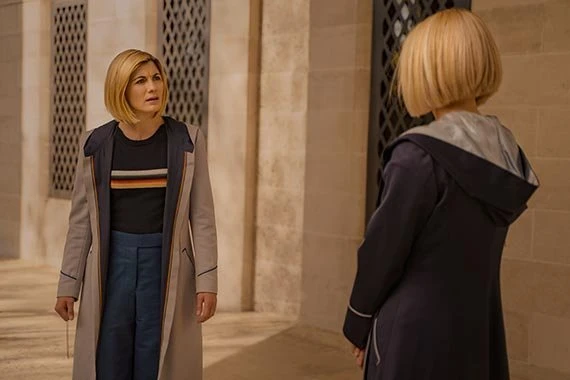
So no, Chibnall didn't manage to tie everything up by the end of part six. There's still a lot of unanswered questions and hanging threads, and that's not necessarily a problem – there are three specials left to cover the Thirteenth Doctor's final days, and doubtless much of this will be revisited. Still, there are some painfully dissatisfying elements that niggled away throughout. While Doctor Who: Flux is full of fantastic elements, with the middle episodes being genuinely among the best in years, the whole is perhaps less than the sum of its parts. Taken week-by-week it's all highly entertaining but taken as a single story it doesn't quite hold together. Nonetheless, it was quite the show.
Review by Daniel Tessier


